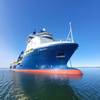Chevron’s Brazil Spill Legal Claims Rise to $22 Billion
Chevron Corp. and Transocean Ltd. are being sued for $22 billion in environmental damages in Brazil, double initial claims, after a federal prosecutor filed a second lawsuit over oil spills off the nation’s coast, according to Bloomberg.
Chevron committed “a series of errors” which led to the March spill at Frade, the second incident at the offshore oil project, the federal prosecutors’ office said yesterday. Prosecutor Eduardo Santos de Oliveira is also seeking to halt operations at Frade and block San Ramon, California- based Chevron from transferring profits from Brazil.
“The oil spill at the Frade field hasn’t been contained,” Oliveira said. “The damages to the environment and to Brazil’s natural resources are incalculable at this point.”
A leak of 3,000 barrels of crude into the Atlantic Ocean off Rio de Janeiro’s coast in November and a seep in March have led to a slew of probes against Chevron and Transocean, which operated the rig at Frade. Oliveira filed the first 20 billion-real ($11 billion) lawsuit last year and pressed criminal charges against executives of the two companies last month, seeking penalties of as many as 31 years in prison.
Brazil risks discouraging other foreign oil companies from investing in the country, as it seeks to develop the largest oil discoveries in the Americas since Mexico’s Cantarell find in 1976, said Cleveland Jones, an oil specialist and geology professor at Rio de Janeiro State University.
“Other companies must be scared, even if they’re 100 percent right, that they can be crucified in the court of public opinion,” Jones said.
A drilling accident caused the November spill, after Chevron underestimated the amount of pressure at a reservoir, causing oil to leak from the well to fissures on the seabed.
In March, Chevron reported new leaks on the seabed at the project. Chevron said on March 29 that about a barrel of oil leaked from the seabed that month. Chevron is collecting the oil in underwater traps. The incident hasn’t damaged marine life, the company said.
“Chevron will vigorously defend the company and its employees,” said Kurt Glaubitz, a spokesman, who called the charges “outrageous” and “without merit.”
“The 20 billion-real figure in both civil lawsuits is arbitrary and has no legal and factual basis,” Glaubitz said.
Transocean “acted responsibly, appropriately and quickly, putting safety first,” said Guy Cantwell, a spokesman for the Vernier, Switzerland-based company. The crew “always maintained control of the well, and the rig’s equipment worked perfectly.”
Oliveira also started a probe into the work by Brazil’s federal environmental agency, Ibama, and oil regulator ANP to monitor companies which explore the country’s offshore fields. He will also investigate emergency and accident prevention plans at all platforms operating in the Campos Basin, where about 90 percent of Brazil’s crude is produced.
Petroleo Brasileiro SA, the country’s state-controlled oil producer, may be liable for 30 percent of any damages Chevron must pay at Frade because it has a stake in the project, according to a March 30 regulatory filing. The $11 billion claim filed last year was “unreasonable,” Petrobras, as the Rio de Janeiro-based producer is known, said in the filing.
Petrobras didn’t respond to an e-mail and telephone call seeking further comments on its exposure to damages.
Chevron holds a 52 percent stake in Frade and is the operator. Partners include Petrobras and Frade Japao Petroleo Ltda. - a joint venture of INPEX Corp., Sojitz Corp. and Japan Oil, Gas and Metals National Corp. - with 18.26 percent.
Chevron also faces probes and fines from the ANP, Ibama and Rio de Janeiro state’s environment secretariat.
Oliveira’s criminal charges against Chevron, Transocean and 17 of their top executives in Brazil on March 21 included a request for them to surrender their passports.
In the first lawsuit seeking damage payments, filed on December 14, Oliveira asked for the suspension of all activities by Chevron and Transocean in Brazil until a final ruling on the case. Federal Judge Raffaele Felice Pirro rejected the request on February 28, arguing that it would represent a punishment before the companies had a chance to defend themselves.
Pirro’s decision preventing the suspension was upheld by a federal appeals court on March 29, following prosecutor Gisele Port’s questioning of the ruling three days earlier (Bloomberg).













